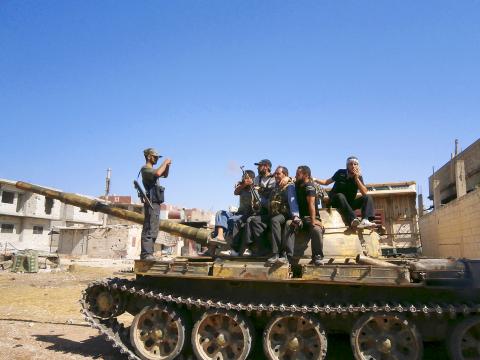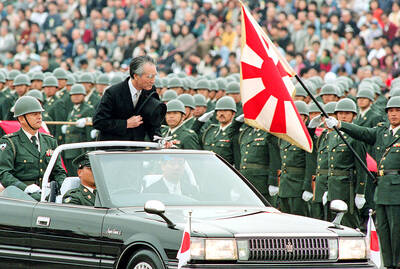Veteran troubleshooter Lakhdar Brahimi took up faltering international attempts to end the Syria conflict yesterday, leaving predecessor Kofi Annan to tend his diplomatic wounds.
With Syria marking the bloodiest month yet in the civil war and mounting fears of turmoil in surrounding countries, there are low expectations that the former Algerian foreign minister will have any more success than Annan.
Most Western countries believe Syrian President Bashar al-Assad’s forces will now fight it out with the opposition until one has an advantage that will allow a political accord.

Photo: Reuters
Brahimi, who made his name brokering an accord in Lebanon’s civil war in the 1980s and as a UN envoy to Afghanistan and Iraq, was to hold meetings yesterday at the UN headquarters ahead of a handover encounter on Tuesday with UN Secretary-General Ban Ki-moon and Annan, a UN spokesman said. Ban and Brahimi will discuss the war at the UN General Assembly the same day.
He expects to go to Damascus soon to meet al-Assad and to Cairo for talks with Arab League officials, his spokesman Ahmad Fawzi said. However, no details of any initiative have yet emerged.
Annan halted his six-month battle to make al-Assad and opposition rebels lay down their guns, complaining at the lack of support among the major powers for his six-point peace plan.
The former UN secretary-general had called for sanctions against al-Assad to make him comply with the plan, but Russia and China used their powers as permanent UN Security Council members to block three resolutions which could have led to economic measures.
The council is now hopelessly divided on any move on the 17-month old war which Syrian activists say has left more than 25,000 dead. The US, Britain, France and other Western and Arab nations are concentrating their efforts outside the council.
The Syrian opposition had virtually disavowed Annan’s efforts by the time he resigned and al-Assad had ignored all parts of the plan he had personally agreed with the envoy.
“Annan was the victim of an increasingly vicious campaign of public denunciations, not least by friends of the rebels who want to see the war go on until Assad falls,” said Richard Gowan, associate director of New York University’s Center on International Cooperation. “It’s likely that the same critics will target Brahimi, making his work harder.”
Annan “blew his credibility” by failing to enforce deadlines in his peace plan while al-Assad forces stepped up shelling of protest cities, according to Andrew Tabler, a Syria expert at the Washington Institute for Near East Policy.
“Brahimi has an opportunity to regain UN credibility, but he is operating under the constraint of a divided UN Security Council,” Tabler added.
The Security Council has maintained its backing for Annan’s six point plan, which calls for an end to violence as a key step to starting a political transition. The international powers also signed up for an accord agreed at a Geneva meeting with Annan on June 30 that called for a transitional government.
However, Brahimi has made no firm commitment to keep to them.
“I have a tool box and there are several useful tools that are in that tool box that I can use when and if possible,” Brahimi’s spokesman quoted him as saying.
“Brahimi is very well respected around the UN and has wisely avoided premature announcements about his plans, but the chances for a diplomatic solution through the UN are even lower than they were when Annan started work in the spring,” Gowan said.
“Brahimi’s best opportunity to mediate will come if and when the military situation gets decisively worse for Assad,” he added. “That could persuade Russia and China to take a more flexible approach at the UN.”
“The impression is that both sides are for the moment determined to fight until the end,” French UN envoy Gerard Araud said. “So a political process is possible only when one or both parties decide that it is necessary to find a political process. For the moment, to be frank, there is no signal of that.”

The Venezuelan government on Monday said that it would close its embassies in Norway and Australia, and open new ones in Burkina Faso and Zimbabwe in a restructuring of its foreign service, after weeks of growing tensions with the US. The closures are part of the “strategic reassignation of resources,” Venezueland President Nicolas Maduro’s government said in a statement, adding that consular services to Venezuelans in Norway and Australia would be provided by diplomatic missions, with details to be shared in the coming days. The Norwegian Ministry of Foreign Affairs said that it had received notice of the embassy closure, but no

A missing fingertip offers a clue to Mako Nishimura’s criminal past as one of Japan’s few female yakuza, but after clawing her way out of the underworld, she now spends her days helping other retired gangsters reintegrate into society. The multibillion-dollar yakuza organized crime network has long ruled over Japan’s drug rings, illicit gambling dens and sex trade. In the past few years, the empire has started to crumble as members have dwindled and laws targeting mafia are tightened. An intensifying police crackdown has shrunk yakuza forces nationwide, with their numbers dipping below 20,000 last year for the first time since records

EXTRADITION FEARS: The legislative changes come five years after a treaty was suspended in response to the territory’s crackdown on democracy advocates Exiled Hong Kong dissidents said they fear UK government plans to restart some extraditions with the territory could put them in greater danger, adding that Hong Kong authorities would use any pretext to pursue them. An amendment to UK extradition laws was passed on Tuesday. It came more than five years after the UK and several other countries suspended extradition treaties with Hong Kong in response to a government crackdown on the democracy movement and its imposition of a National Security Law. The British Home Office said that the suspension of the treaty made all extraditions with Hong Kong impossible “even if

Former Japanese prime minister Tomiichi Murayama, best known for making a statement apologizing over World War II, died yesterday aged 101, officials said. Murayama in 1995 expressed “deep remorse” over the country’s atrocities in Asia. The statement became a benchmark for Tokyo’s subsequent apologies over World War II. “Tomiichi Murayama, the father of Japanese politics, passed away today at 11:28am at a hospital in Oita City at the age of 101,” Social Democratic Party Chairwoman Mizuho Fukushima said. Party Secretary-General Hiroyuki Takano said he had been informed that the former prime minister died of old age. In the landmark statement in August 1995, Murayama said